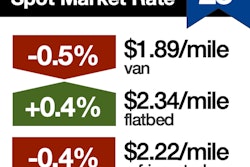Regular readers will recall small fleet owner Marta Vidaurreta‘s story from late last year about broker Bennett International Group’s withholding payment on a load after a cargo claim on a prior flatbed haul for the broker. That claim, after many months, was denied by Vidaurreta’s insurance company when damages were shown clearly to not have arisen during transit. Such brokerages’ practice are enabled by claims “offset” — or setoff — clauses in many brokerages’ contracts, as I wrote last week about another case of such that came across the desk here. They lay bare just where too many brokers’ allegiances lie, as those who engage in it when carrier negligence is clearly disproven show their willingness to sacrifice a carrier’s business to please shipper customers or just line their own pockets, instead of working through disputes like reasonable people (admittedly not always a common practice for all manner of trucking-industry parties).
 Vidaurreta likens such contract clauses so exercised to a boomerang. Protect your head.
Vidaurreta likens such contract clauses so exercised to a boomerang. Protect your head.Vidaurreta noted her case that I wrote about was done, and she finally had received all payments her business was due for loads hauled with the broker last year, though it took quite a while. “My insurer took months, many months, to deny that claim,” she wrote to me last week. Finally, though, Bennett paid for the load they’d held payment on apparently as offset.

Vidaurreta believes use of the offset clause to withhold payment is “abusive, too abusive for us, the carriers. But if a carrier wants, or needs, a specific load” with a broker, he/she will “sign and agree to the broker’s contract, never thinking that [offset] clause will be a boomerang” in the event of any claim at all, “hitting strongly the carrier’s finances.”
It reminds of Ralph Ellison’s fictional Invisible Man and that book’s narrator’s invocation of the boomerang. “Beware of those who speak of the spiral of history; they are preparing a boomerang. Keep a steel helmet handy.”
In the case of claims offset clauses, the red pen — and some intestinal fortitude — may be the appropriate headgear, though a speedy insurance company armed with good data on the load can help, too, as this trucker’s case showed.
Rolling Stone on LGBTQ haulers
Author Anne Balaz took a tour through trucking now memorialized in a book. As wrote writer Leigh Ann Carey in a story that debuted over the weekend via Rolling Stone:
Her journey from academia to the open road inspired her latest book, Semi-Queer: Inside the World of Gay, Trans, and Black Truck Drivers. While truck driving may not seem like the most obvious choice for a queer person, Balay says she’s not the only one. “The industry has long been a haven for misfits and people who don’t follow rules well,” she says. For bodies often restricted and derided, the perpetual motion the job affords is meaningful. It is harder for oppressive cultural norms to take hold of you if you are constantly evading their grasp.
Read more via this link. Profiled in part there, too, are team haulers Nic Richelle and Carla Grimsley, a married lesbian couple; trans team Brandie and Stephanie Diamond; Shelle Lichti, longtime trucker and founder of the LGBT Truckers support group; and others.
What shortage?
Reporting from NBC News’ Nicole Spector’s ridealong with UPS driver Becky Ascencio assumes the reality of a “growing shortage of drivers” in its second paragraph, but as is somewhat usual with such mainstream stories, the reality is more complicated.
When it comes to UPS’ own views on the subject, delivered via Spector’s reporting from last year on the “driver shortage subject,” one comes away with a view more akin to that of the Owner-Operator Independent Drivers Association than what you’ll hear from most in big trucking on any given day. The company “isn’t facing any general shortage of drivers,” Spector wrote, summarizing the thoughts of a company rep.
Why not? It comes down, as can be expected, to income levels and predictability of schedule there. Read the piece about running with Ascencio for a day for some of the details on the benefits the hauler accrues employed by the company.










